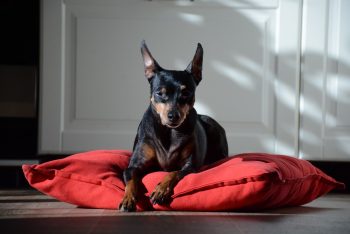Miniature Pinschers, affectionately known as Min Pins, are often mistaken for small Dobermans, but these spirited and energetic dogs have an identity all their own. With their sharp alertness, boundless energy, and feisty demeanor, the question often arises – are Miniature Pinschers aggressive? Let’s delve deep into the world of Min Pins to unravel this myth.
Historical Context: The Miniature Pinscher’s Roots
While their name may suggest they are miniature versions of the Doberman Pinscher, Miniature Pinschers actually have a distinct lineage that predates the Doberman. Historically, they were bred in Germany for hunting rats in homes and stables. This hunting background endowed them with a strong prey drive and an independent nature, which can sometimes be mistaken for aggression.
Temperament: Understanding the Miniature Pinscher’s Nature
Miniature Pinschers are known for their bold and assertive personalities. While they’re small in stature, they certainly don’t see themselves that way. Often described as “big dogs in small bodies”, Min Pins are fearless, energetic, and confident. However, their assertiveness can sometimes be perceived as aggression, especially if they aren’t trained or socialized properly.
Training and Miniature Pinschers: Curbing Undesirable Behaviors
Training plays a crucial role in shaping the behavior of Miniature Pinschers. These intelligent dogs are quick learners, but they also have a stubborn streak. Consistent, positive reinforcement-based training from a young age can help harness their energy and prevent undesirable behaviors.
Early Socialization: Exposing Miniature Pinschers to various situations, people, animals, and sounds during their formative puppy months can reduce fearful or aggressive responses later in life.
Basic Obedience: Teaching commands such as “sit”, “stay”, and “leave it” can help in controlling a Min Pin’s impulsive behaviors.
Avoiding Negative Reinforcement: Due to their sensitive nature, negative reinforcement methods can be counterproductive and can lead to increased aggression in Miniature Pinschers.
Environment’s Role in a Miniature Pinscher’s Behavior
The environment in which a Miniature Pinscher is raised and lives can significantly influence its behavior. Here’s how:
Space to Play: Miniature Pinschers are active and energetic. A suitable space for them to play and expend their energy can prevent frustration or aggression.
Consistent Routines: Min Pins thrive in environments where there’s consistency. Regular feeding, playtime, and sleeping routines can provide a sense of security, reducing anxiety-related aggressive behaviors.
Positive Interactions: Regular positive interactions with family members and other pets can foster trust and reduce any aggressive tendencies.
Health and Behavior: Is My Miniature Pinscher’s Aggression Health-Related?
Sometimes, aggressive behaviors in Miniature Pinschers can be linked to underlying health issues. Dental problems, joint pains, or hidden injuries can cause discomfort, leading to a more aggressive response. Regular vet check-ups can ensure that any health-related behavioral changes are promptly addressed.
Conclusion: Are Miniature Pinschers Truly Aggressive?
While Miniature Pinschers can be assertive and bold, labeling them as inherently aggressive would be a misrepresentation. Like all breeds, their behavior largely depends on training, socialization, environment, and individual personality. With proper guidance, Min Pins can be affectionate, loyal, and well-behaved companions.
Frequently Asked Questions About Miniature Pinschers & Aggression
1. Are Miniature Pinschers naturally aggressive?
Miniature Pinschers are not inherently aggressive. However, they are assertive, bold, and can be territorial, which can sometimes be mistaken for aggression. With proper training and socialization, their behavior can be managed and directed positively.
2. How does early socialization impact the behavior of Miniature Pinschers?
Early socialization is vital for Miniature Pinschers. Exposing them to different people, animals, and environments during their puppy phase helps reduce any potential aggressive or fearful behaviors later on, making them well-rounded and adaptable adults.
3. Do Miniature Pinschers get along with other pets?
With proper introduction and socialization, Miniature Pinschers can get along with other pets. However, due to their strong prey drive, they may chase smaller animals. It’s essential to supervise interactions, especially during the initial stages.
4. Can a consistent environment reduce aggressive tendencies in Miniature Pinschers?
Yes, a consistent environment offers Miniature Pinschers a sense of security. Regular routines for feeding, playing, and sleeping can help alleviate any anxiety-related behaviors and ensure a more balanced temperament.
5. How does training affect the behavior of a Miniature Pinscher?
Training, especially when started early, plays a pivotal role in molding the behavior of Miniature Pinschers. Consistent, positive reinforcement-based training can help manage their energy and curb any undesirable behaviors, turning them into well-behaved companions.
6. Are male Miniature Pinschers more aggressive than females?
Aggression isn’t typically gender-specific in Miniature Pinschers. Both males and females can exhibit assertive behaviors, but with proper training and socialization, any aggressive tendencies can be minimized.
7. How do health issues relate to aggression in Miniature Pinschers?
Sometimes, aggressive behaviors can be a result of underlying health problems. Discomfort from issues like dental problems or joint pains can make a Miniature Pinscher more irritable. Regular veterinary check-ups can help identify and address such concerns.
8. Why should one consider adopting a Miniature Pinscher from a rescue or shelter?
Adopting a Miniature Pinscher from a rescue or shelter gives a second chance to a dog in need. These dogs often come with some basic training and a known behavioral background, which can ease the integration process. Plus, rescues often provide valuable post-adoption support.
9. How can I reduce food aggression in my Miniature Pinscher?
Food aggression can be managed through training. Techniques like hand-feeding, teaching the “wait” command, and ensuring a quiet and undisturbed eating environment can help in reducing such behaviors in Miniature Pinschers.
10. Are Miniature Pinschers protective of their owners, leading to aggression?
Miniature Pinschers are loyal and can be protective of their families. While this trait can be endearing, if not managed properly, it can lead to aggressive behaviors towards strangers. Proper training and socialization can help strike a balance, ensuring they are protective but not overly aggressive.
The post Are Miniature Pinschers Aggressive? appeared first on iHeartDogs.com.

